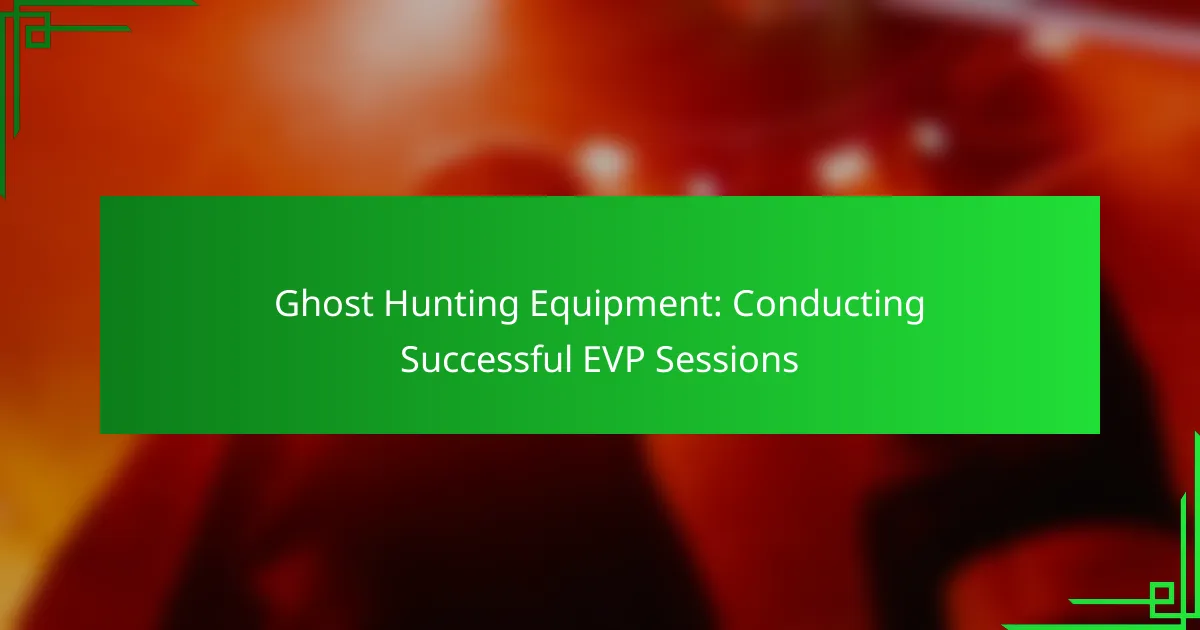Conducting successful EVP sessions requires the right equipment and techniques to capture potential paranormal audio evidence. Essential tools include digital voice recorders, microphones, and audio editing software, each playing a vital role in the process. By selecting high-quality recording devices and employing effective strategies, you can enhance your chances of capturing intriguing electronic voice phenomena.
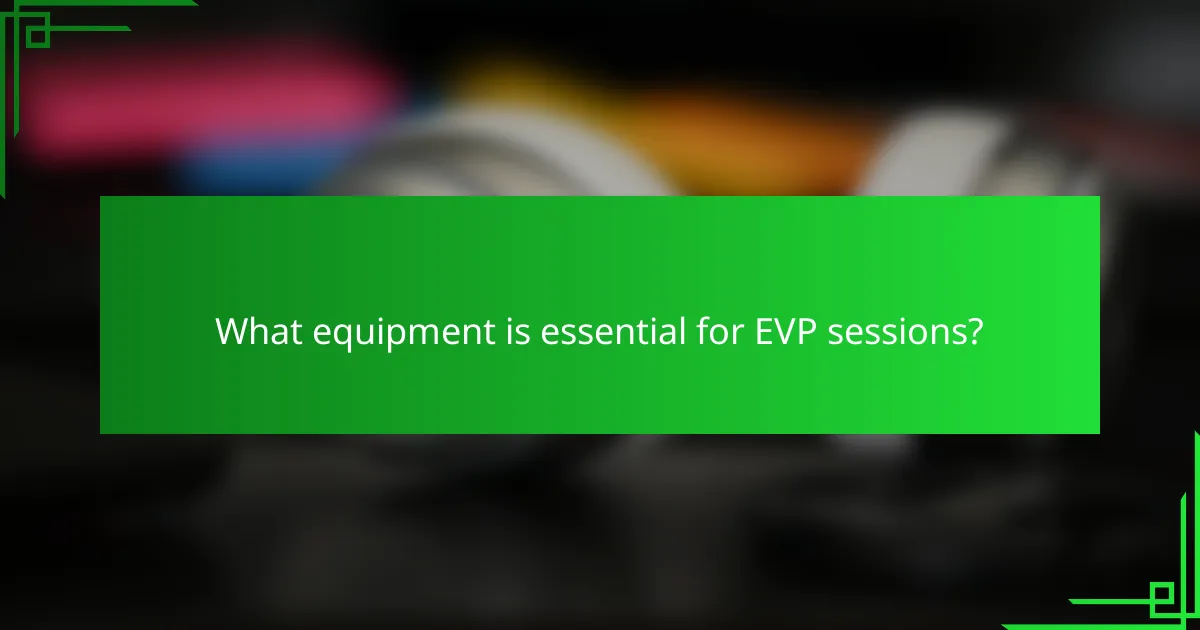
What equipment is essential for EVP sessions?
Essential equipment for Electronic Voice Phenomena (EVP) sessions includes digital voice recorders, microphones, headphones, audio editing software, and EMF meters. Each of these tools plays a crucial role in capturing and analyzing potential paranormal audio evidence.
Digital voice recorders
Digital voice recorders are fundamental for EVP sessions as they capture audio clearly and can store hours of recordings. Look for models with high sensitivity and low noise levels to ensure the best quality. Many recorders also offer features like adjustable gain settings, which can help in varying environments.
When selecting a recorder, consider battery life and storage capacity. A device that can record for several hours without needing a recharge is ideal for extended sessions in the field.
Microphones
Using external microphones can significantly enhance audio quality during EVP sessions. Directional microphones are particularly useful as they can focus on sounds coming from a specific direction while minimizing background noise. This is crucial in environments where ambient sounds can interfere with recordings.
Investing in a good-quality microphone can make a noticeable difference in the clarity of captured voices. Consider options that are compatible with your digital recorder for seamless integration.
Headphones
Headphones are essential for monitoring audio in real-time during EVP sessions. Closed-back headphones are recommended as they block out external noise, allowing you to focus on subtle sounds that may indicate paranormal activity. Look for models that provide a comfortable fit for long periods of use.
Using headphones during playback can also help you discern faint voices that may not be immediately apparent. This can be particularly useful when analyzing recordings after a session.
Audio editing software
Audio editing software is vital for analyzing and enhancing recordings made during EVP sessions. Programs like Audacity or Adobe Audition allow users to manipulate audio tracks, adjust volume levels, and apply filters to isolate potential EVP. Familiarity with these tools can greatly improve your ability to identify and interpret findings.
When choosing software, consider user-friendliness and the specific features you need, such as noise reduction or spectrogram analysis. Many options are available for free or at a low cost, making them accessible for beginners.
EMF meters
EMF meters are used to detect electromagnetic fields, which some believe may correlate with paranormal activity. These devices measure electromagnetic radiation levels in the environment, helping to identify areas of interest during EVP sessions. Look for meters that provide real-time readings and have a sensitivity range suitable for your investigation needs.
While EMF meters are not directly related to audio capture, they can help establish a context for your EVP findings. Be cautious, as false positives can occur due to electronic devices in the vicinity, so always cross-reference readings with other evidence.

How to choose the best EVP recording device?
Choosing the best EVP recording device involves assessing key features such as audio quality, battery life, and storage capacity. These factors significantly impact the effectiveness of your electronic voice phenomena sessions and can influence the clarity and duration of your recordings.
Consider audio quality
Audio quality is crucial for capturing clear EVP recordings. Look for devices that offer high sample rates and bit depth, as these specifications enhance sound fidelity. A good starting point is a device that records at least 44.1 kHz and 16-bit, which is CD quality.
Additionally, consider the microphone type. Condenser microphones are often preferred for their sensitivity and ability to pick up subtle sounds, making them ideal for ghost hunting. Test devices in quiet environments to gauge their performance before making a purchase.
Evaluate battery life
Battery life is an essential consideration for EVP sessions, especially during long investigations. Aim for devices that can last several hours on a single charge or set of batteries. Many models offer battery life ranging from 8 to 20 hours, which is generally sufficient for overnight investigations.
It’s advisable to carry spare batteries or a portable charger to avoid interruptions during your sessions. Keep in mind that recording quality can drain batteries faster, so choose a device that balances performance with longevity.
Check for storage capacity
Storage capacity determines how much audio you can record before needing to transfer files. Look for devices that support expandable storage options, such as microSD cards, which allow you to increase capacity as needed. A minimum of 16 GB is recommended for extensive EVP sessions.
Additionally, consider the file formats supported by the device. WAV files offer higher quality but take up more space, while MP3 files save space but may reduce audio fidelity. Choose a device that provides flexibility in file formats to suit your recording needs.
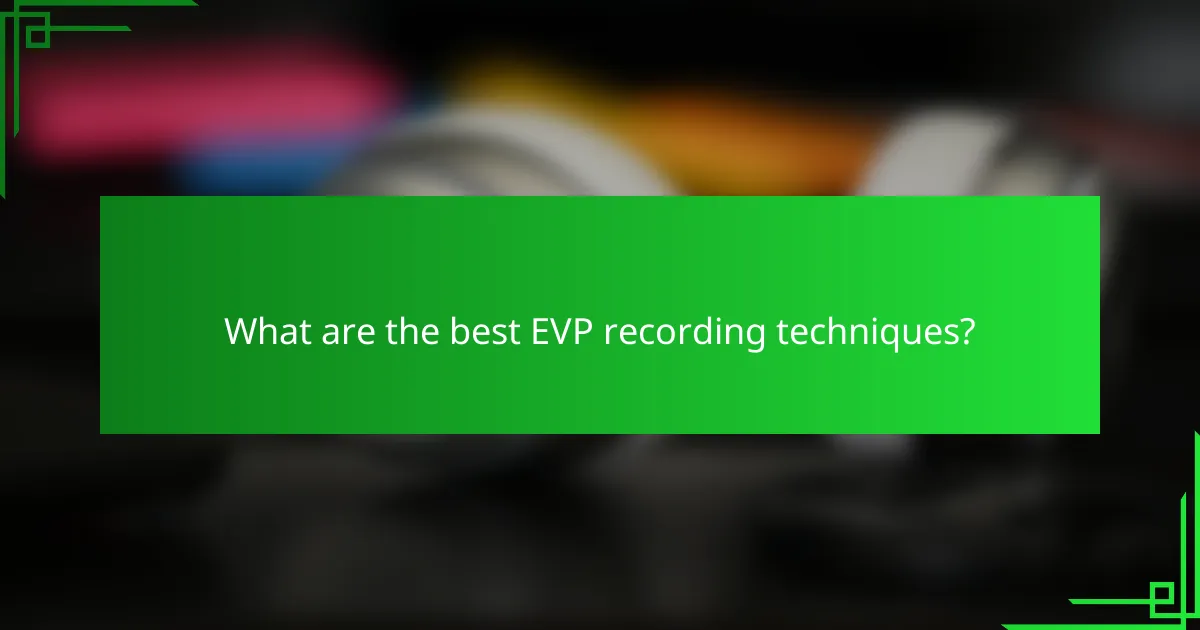
What are the best EVP recording techniques?
The best EVP recording techniques focus on creating an environment conducive to capturing electronic voice phenomena. Key strategies include asking open-ended questions, choosing quiet locations, and timing your sessions to maximize potential responses.
Use open-ended questions
Open-ended questions encourage more elaborate responses from potential spirits, increasing the chances of capturing meaningful EVPs. Instead of asking yes or no questions, frame inquiries that require detailed answers, such as “What is your name?” or “Can you tell us about your experience here?”
These types of questions allow for a broader range of responses, which can lead to more interesting and insightful recordings. Be patient and give time for a reply, as responses may not come immediately.
Conduct sessions in quiet locations
Choosing quiet locations is crucial for effective EVP sessions, as background noise can interfere with the clarity of recordings. Seek out areas that are isolated and free from human activity, such as abandoned buildings or remote outdoor settings.
Before starting your session, listen carefully to the environment and eliminate any potential distractions. This might involve waiting for nearby traffic to subside or ensuring that electronic devices are turned off to avoid interference.
Record during specific times
Timing can significantly impact the success of EVP sessions. Many ghost hunters suggest conducting recordings during late night or early morning hours when ambient noise levels are lower and spiritual activity may be heightened.
Additionally, consider aligning your sessions with specific dates or events that may hold significance, such as anniversaries of historical events or local legends. This can create a stronger connection to the energies you are trying to communicate with.
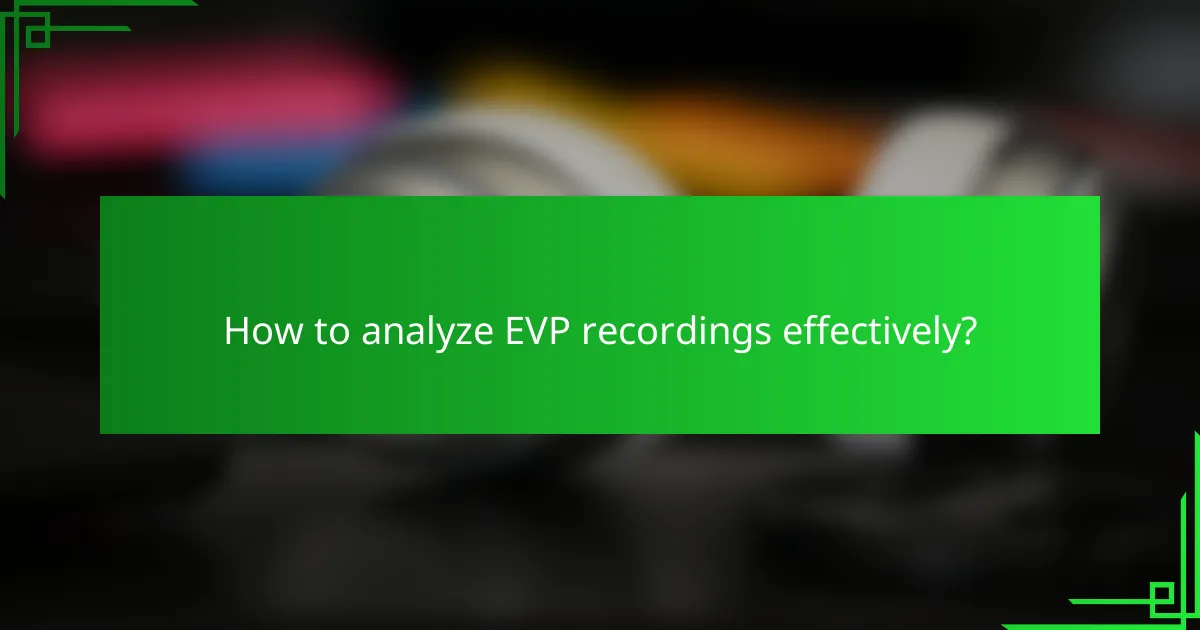
How to analyze EVP recordings effectively?
Analyzing EVP recordings involves careful listening and the use of specialized tools to identify potential evidence of paranormal activity. Effective analysis requires attention to detail and a systematic approach to distinguish genuine anomalies from background noise.
Use audio editing software
Audio editing software is essential for analyzing EVP recordings as it allows you to manipulate sound waves, enhance clarity, and isolate specific segments. Popular options include Audacity and Adobe Audition, which offer tools for noise reduction, equalization, and amplification.
When using audio editing software, focus on adjusting the frequency ranges to highlight voices or sounds that may be obscured by background noise. A good practice is to apply a high-pass filter to remove low-frequency hums, making it easier to hear potential EVPs.
Listen for anomalies
Listening for anomalies involves identifying sounds that stand out from the normal background noise. Pay attention to whispers, voices, or sounds that seem out of place, particularly those that occur during silent moments in the recording.
To improve your chances of detecting anomalies, listen to the recording multiple times, each time focusing on different segments. Consider using headphones to enhance sound clarity and detail, which can help you catch subtle variations that might indicate paranormal activity.
Compare with known sounds
Comparing your EVP recordings with known sounds can help you determine whether the anomalies are genuine or simply misidentified noises. Create a library of common sounds, such as electrical interference, wind, or animal noises, to use as a reference during analysis.
When you encounter an anomaly, cross-reference it with your sound library. If it closely resembles a known sound, it may not be paranormal. However, if it remains unidentifiable, it could warrant further investigation. Document your findings to track patterns and improve future analysis efforts.
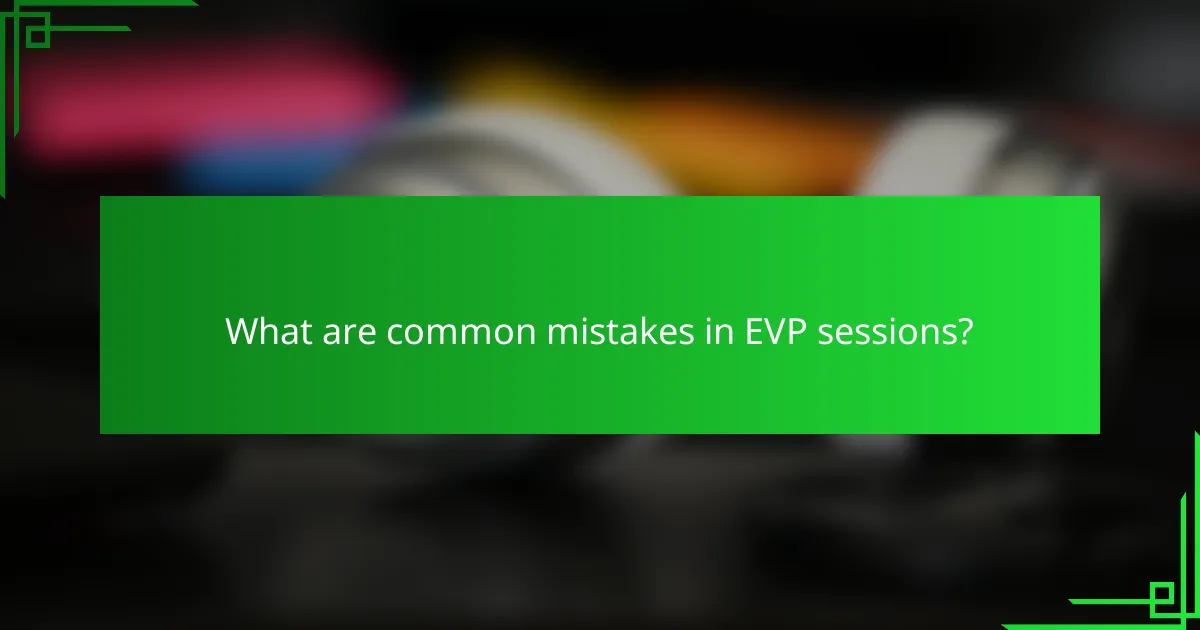
What are common mistakes in EVP sessions?
Common mistakes in Electronic Voice Phenomena (EVP) sessions can significantly hinder the quality of the recordings and the overall experience. Awareness of these pitfalls can improve the chances of capturing clear and meaningful responses.
Ignoring environmental noise
Environmental noise can severely impact the clarity of EVP recordings. Sounds from traffic, wind, or even electronic devices can mask potential responses, making it difficult to discern genuine phenomena. Always choose a quiet location and consider using soundproofing materials or techniques to minimize background noise.
Before starting a session, conduct a sound check to identify any persistent noises in the area. If possible, schedule your EVP sessions during times when the environment is naturally quieter, such as late at night or early morning.
Not preparing questions in advance
Failing to prepare questions ahead of time can lead to disorganized sessions and missed opportunities for meaningful interaction. Having a list of clear, concise questions helps maintain focus and encourages more direct responses from any potential entities.
Consider using open-ended questions that invite elaboration, such as “Can you tell me your name?” or “What do you want us to know?” This approach can yield richer responses compared to yes-or-no questions. Aim for a balance of specific and general inquiries to cover various aspects of the investigation.
Failing to document sessions
Documentation is crucial for analyzing EVP sessions and tracking progress over time. Without proper records, it becomes challenging to identify patterns or revisit significant findings. Always keep a detailed log of each session, including date, time, location, equipment used, and any notable occurrences.
Consider using a standardized format for your documentation to ensure consistency. This could include sections for questions asked, environmental conditions, and initial impressions of the recordings. Regularly reviewing your notes can help refine your approach and improve future sessions.
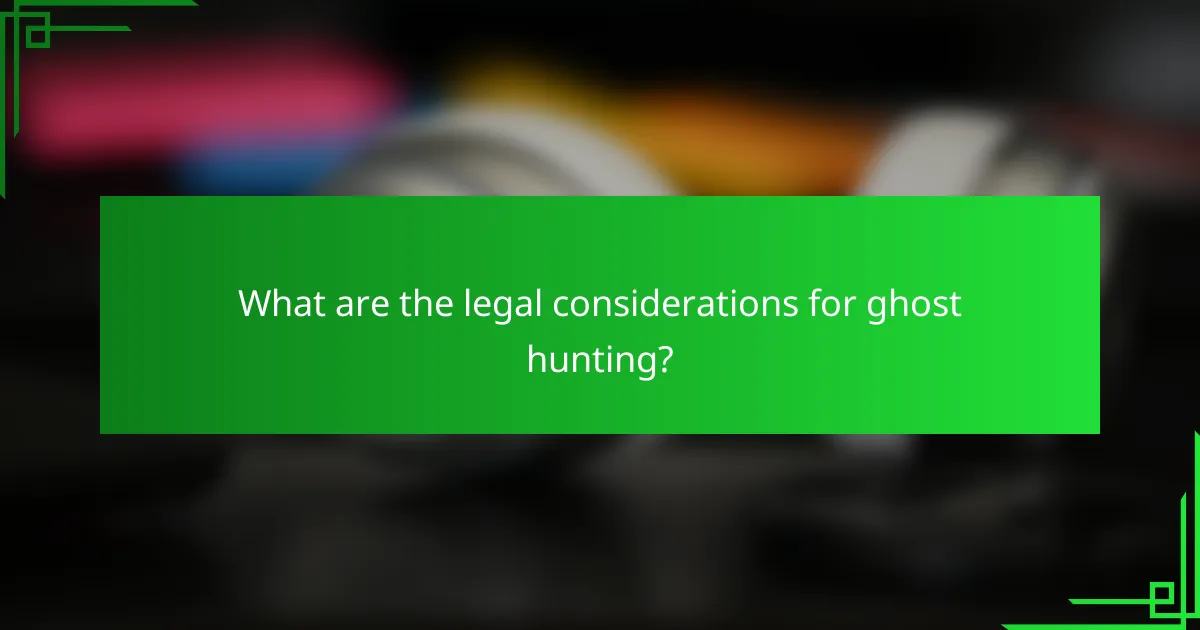
What are the legal considerations for ghost hunting?
Legal considerations for ghost hunting primarily involve obtaining permission to access locations and adhering to local laws regarding trespassing and privacy. Always ensure that you are allowed to conduct investigations in the chosen area to avoid legal repercussions.
Permission and Access
Before conducting any ghost hunting activities, it is crucial to secure permission from property owners or managers. This may involve formal agreements or verbal consent, depending on the location. Failing to obtain permission can lead to trespassing charges, which vary in severity based on local laws.
In some cases, historical sites or private properties may have specific regulations governing access. Researching these rules beforehand can save time and prevent legal issues during your investigation.
Privacy Laws
Privacy laws can impact ghost hunting, particularly when it comes to recording audio or video. In many jurisdictions, consent is required from individuals present during recordings, even in public spaces. Familiarize yourself with local privacy regulations to ensure compliance.
For instance, some states in the U.S. have “two-party consent” laws, meaning all parties involved must agree to be recorded. Ignoring these laws can result in legal action against you.
Liability and Insurance
Liability is another important consideration when ghost hunting. If someone is injured during your investigation, you could be held responsible. Obtaining liability insurance can protect you from potential lawsuits and provide peace of mind.
Consider forming or joining a ghost hunting group that has insurance coverage. This can help distribute risk and ensure that all members are protected while conducting investigations.
